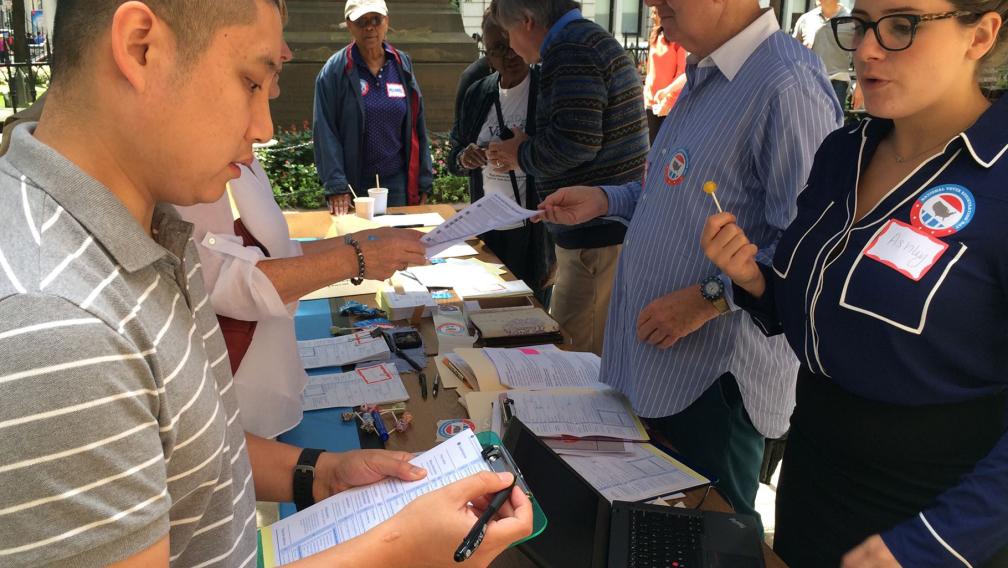Voting is a Gift. Let's Exercise It.

As we make our way through this election year, I’d like to remind us that 2020 is the 100th anniversary of the ratification of the 19th amendment to the constitution giving women the right to vote.
Enfranchisement of women was a long and difficult process. The amendment was first introduced to Congress in 1878. It was then reintroduced every year for 40 years! In their efforts to win the vote, suffragists endured imprisonment, forced feedings, and being sent to mental hospitals.
Winning the right to vote was complicated by our nation’s systemic racism, patriarchy and unbridled capitalism. Opponents believed women’s purity would be sullied by the sordid nature of politics. And the prospect of women of color gaining the vote threatened Jim Crow laws. Leaders in the liquor and the garment industry did not want women voters who would inevitably support expanded prohibition and child labor laws, damaging their profits.
And while we have courageous stories about the “mothers” of women’s suffrage like Elizabeth Cady Stanton and Susan B. Anthony, they and the leaders that followed them, did little to include their African-American sisters. In fact, many white suffrage leaders worked to convince white citizens that women’s vote would hold the line on Jim Crow practices. In suffrage demonstrations across the country, African-American suffragists were assigned to the back of the line by their white “sisters.” Even after the 19th amendment was passed in 1920, women of color faced barriers at the polls, just as their husbands, brothers and sons did. But they persevered with leaders such as Mary Church Terrell who understood it was not possible to disconnect gender and race equity. It wasn’t until the Voting Rights Act of 1965 that voters of color gained real access to the polls.
So, for people who say, “My vote doesn’t matter,” I ask, if it doesn’t matter, why has there been (and continues to be) such an effort to stop certain people from voting? If it doesn’t matter, why do people in power care so much about the vote? Why are certain states instituting voter ID laws when there is little to no evidence of voter fraud? For an example of how important a single vote can be, check out the story on this 3-minute podcast, “How to Vote.”
Each vote does matter, and it matters especially to those who identify as people of faith. In the Episcopal tradition, we promise at baptism to “strive for justice and peace among all people and respect the dignity of every human being.” Part of this promise is to vote for the common good. We vote for our neighbor so that all have decent housing, food, education and income. I call this praying with your vote. Pope Francis calls it “faith-filled citizenship” that “always involves a deep desire to change the world, to transmit values, to leave this earth somehow better than we found it.”(Evangelii Gaudium). And our Presiding Bishop Michael Curry instructs, “Vote your conscience. Your conscience informed by what it means to love your neighbor, to participate in the process of seeking the common good, to participate in the process of making this a better world.”
So, let’s all exercise this precious gift of the vote and make sure our friends and family are registered too. If you live in New York state, your first opportunity is coming up on June 23rd with primary elections for US Congress and the New York State Senate. And EVERYONE can vote by absentee ballot in New York this year. And if you aren’t registered, do it NOW because the national election for the U.S. Congress, the Senate, and the Presidency is coming up in November. Almost everything you need to know about voting in New York City can be found here. And for more info about voting check out the podcast, “How to Vote in an Election” and stay tuned for more election info and advocacy in the coming months.
PS: If you want to learn more about women’s suffrage, I recommend Brent Staple’s New York Times article, "How the Suffrage Movement Betrayed Black Women" and the book The Women’s Hour: The Great Fight to Win the Vote by Elaine Weiss. And stay tuned for Trinity’s upcoming speaker series in October on The Role of Women of Color in the Fight for Enfranchisement.
Ruth Frey is Director of Special Projects & Partnerships on the Trinity Commons staff.





